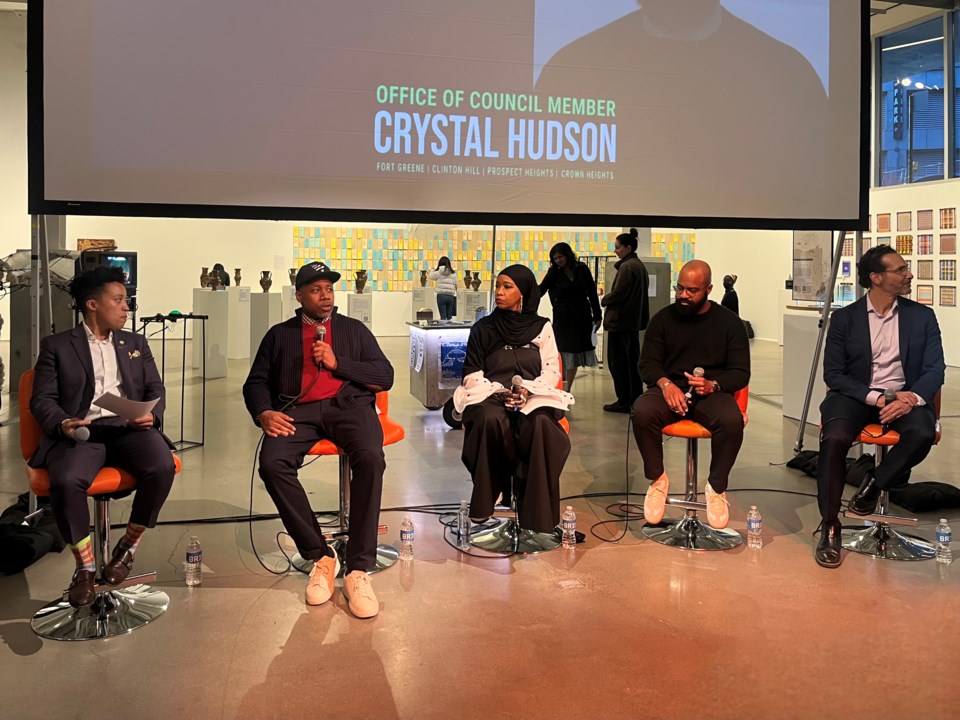Residents from Crown Heights, Prospect Heights, Clinton Hill and Fort Greene on Thursday packed into BRIC in Downtown Brooklyn for Council Member Crystal Hudson's much-anticipated State of the District address, held months before the June Democratic primary where she is seeking re-election.
In a departure from the traditional format of reading a prepared speech followed by a Q&A session, Hudson opted for a more informal approach this year and invited experts to broaden the discussion. The panel included Ryan Russo, the executive director of the National Association of City Transportation Officials; Ramik Williams, co-executive director of Kings Against Violence Initiative; Demetrius McLester, an urban planner at the Department of City Planning; and Zakiyah Shaakir-Ansari, the co-executive director of the Alliance For Quality Education.

Hudson opened with a stark message about the current state of the nation. “Right now, our nation’s most vulnerable communities are under an unprecedented attack from a presidential administration that has prioritized the dismantling of long-standing institutions that care for our most vulnerable citizens,” she said. “As we gather here today, none of us know what tomorrow will look like… and I’ll be honest, things are looking grim, but we’re New Yorkers and we’ve never let fear stop us before, and we won’t start now.”
The conversation quickly turned to the urgent issues facing the district: affordable housing, youth violence and the glaring inadequacies in public transportation.
Shaakir-Ansari spoke on the link between underfunded public education and child inequity. “It’s not rocket science when you see the children who are impacted by inequity. It’s the same communities impacted by inequitable housing, little to no health care and low wages," she said.
Williams addressed the surge in youth violence, emphasizing the need for school support beyond teachers and principals.
“As much as we prioritize effective teachers and principals, we also need to prioritize effective school support,” he said. “Social workers, behavioral health therapists, those individuals that are a part of the community and have an impact on students' lives, but aren’t talked about anywhere.”
While the panelists offered insights into the challenges facing Brooklyn, tensions were palpable throughout the evening. Protesters gathered outside the venue, distributing flyers and voicing their discontent, particularly about the city's handling of affordable housing. For many residents, gentrification remains an ongoing threat to their homes and communities.
“It’s not there for us. Gentrification is killing us,” shouted one protester as she was escorted out of the event. “It is killing Black people. We don’t have homes, we can’t even buy a bagel where we live.”
Hudson addressed these concerns head-on. “Everybody is struggling. Nothing is affordable,” she said, acknowledging the frustrations of her constituents. “One of the things I have been trying to do is build more housing, including deeply affordable housing as well as middle-income housing that addresses the needs of so many of my constituents who come to me specifically saying that I make too much to afford deeply affordable housing, and I also can’t afford market-rate housing. We have to build housing for everybody.”
She also reflected on the significant changes already occurring in the district.
“My district has been gentrified. We are not talking about gentrification now – gentrification has already come and maybe already gone,” Hudson stated. “We are in a whole different phase. While other districts have gone untouched… we try to fight for as much as we can and we have to build for everybody because everybody lives here, whether you want them to be here or not, they are here.”




